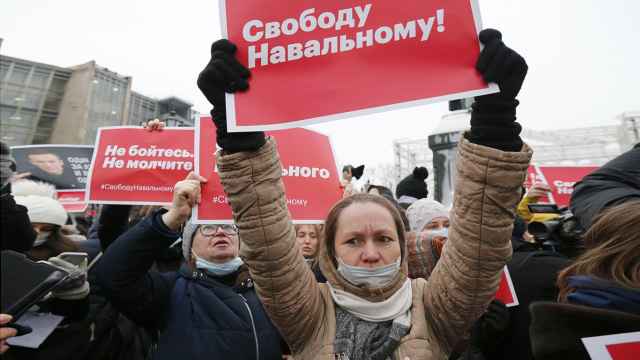Nearly every weekday, Yelena Lysenko-Saltykova puts on her navy blue uniform and gets in the driving carriage of an electric commuter train to ferry passengers between Moscow’s Kievsky Railway Station and the suburb of Novoperedelkino.
It’s not something she takes for granted. As the first female suburban light rail train driver in Russia, Lysenko-Saltykova, 25, is one of a small, but growing band of women doing jobs that were off limits for decades until January, when Russia slashed its list of banned occupations from 476 to 100.
“I’m really happy that finally I can fulfill the job I’ve always dreamed about,” she told The Moscow Times. “Some people thought that it was impossible, but everything is possible when you believe in yourself and have support.”
Starting in the 1970s, Soviet women were banned from physically strenuous jobs, including driving trucks and working as carpenters and auto mechanics, as it was believed such work compromised their safety and childbearing ability. The banned jobs list persisted into post-Soviet Russia, with the government updating it as recently as 2000.
As technologies improved, many of the physically demanding parts of these jobs became automated, yet the jobs remained off-limits. The law finally changed on Jan. 1 after years of efforts by activists, opening up hundreds of new occupations to Russian women.
Lysenko-Saltykova had dreamed of working with machinery since childhood, but was drawn to trains in particular when she learned about railway work during an extracurricular class.
For a time after finishing school, she worked as a locksmith at a train depot — a job that didn’t entail direct work with trains. After many rejections, in 2018 she found a job as a train driver’s assistant with the Central Suburban Passenger Company.
Once she completed the mandated three years as an assistant, Lysenko-Saltykova was ready to take the next step and become a fully-fledged train driver. The banned jobs list was culled just as she passed the exams, allowing her to start right away.
At first, Lysenko-Saltykova faced skepticism and criticism from both men and women, as it is still widely viewed as “not feminine” for Russian women to drive a train. Some social media users even alleged that she was only hired for publicity. But she said she has found support among her colleagues and from the public.
“The guys here at work knew that I would become a train driver, so they were supportive. As for the people who don’t know me and only heard about me in the news, it wasn’t always positive and there was a lot of criticism,” she said, adding that many more people lent their support after her story went public.
Lysenko-Saltykova calls herself an “egalitarian” who supports equal rights for men and women and was a vocal advocate of changing the banned jobs list. Together with Yulia Yurova, the first woman to become a driver's assistant, Lysenko-Saltykova formed a group of aspiring women train drivers who started writing letters to the Labor Ministry and railway officials in 2018.
Her husband Lyosha is also a train driver — the couple held their wedding ceremony in a railway carriage — and they hope their six-year-old daughter Alexandra will choose her profession with her heart.
“She understands perfectly that her gender and her nationality don’t matter — she can be whoever she wants to be,” she said.
Despite a grueling work schedule, with rotating 12-hour day and night shifts, Lysenko-Saltykova said she is able to keep her professional life and home life separate.
“I don’t think there’s a question of balance. Work is work and home is home ... When it comes to the schedule, there are a lot of women in our country doing shift-based work, including doctors and even shop attendants; they all have children as well.”
In the coming months and years, more women are set to follow in Lysenko-Saltykova’s footsteps. She said several women driver’s assistants at her company are now working toward becoming suburban light rail drivers.
And in Moscow's sprawling underground rail system, 12 women became metro drivers for the first time in its modern history, with commemorative Barbie dolls marking the occasion. Over the next five years, the metro plans to train and recruit 500 female drivers.
“There are a lot of us, we are an entire movement of railway girls,” Lysenko-Saltykova said.
More than anything, Lysenko-Saltykova said she hopes her story will inspire both men and women to follow their dreams no matter what society says.
“You always need to remember that it’s your life and it belongs only to you. Only you can decide who to be, what to do and what kind of person to be. No one has the right to influence that.”
A Message from The Moscow Times:
Dear readers,
We are facing unprecedented challenges. Russia's Prosecutor General's Office has designated The Moscow Times as an "undesirable" organization, criminalizing our work and putting our staff at risk of prosecution. This follows our earlier unjust labeling as a "foreign agent."
These actions are direct attempts to silence independent journalism in Russia. The authorities claim our work "discredits the decisions of the Russian leadership." We see things differently: we strive to provide accurate, unbiased reporting on Russia.
We, the journalists of The Moscow Times, refuse to be silenced. But to continue our work, we need your help.
Your support, no matter how small, makes a world of difference. If you can, please support us monthly starting from just $2. It's quick to set up, and every contribution makes a significant impact.
By supporting The Moscow Times, you're defending open, independent journalism in the face of repression. Thank you for standing with us.
Remind me later.







